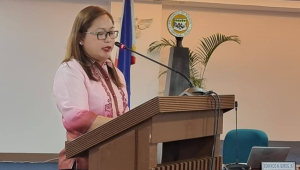The scam allegedly perpetrated by the so-called Kapa Worldwide Ministry has infected the province with the establishment of its offices in different towns and Tagbilaran City.
But officers of the Kapa in Bohol are on the run as its dreamt investment empire begins to collapse before it can stand following the order Of President Duterte to the law enforcers to go after for a large scale scam that preyed on the poor’s hard-earned money.
Kapa, founded by Pastor Joel Apolinario, reportedly entice the public to put their investments, which are considered by Kapa as “donations” with a 30 percent monthly return on investment (ROI).
Apolinario is nowhere to be found following warrants of his arrests have been issued for the alleged Kapa scam in several courts in the Surigao provinces where it first started operating few years ago.
Kapa’s other investment arms are the Kapa Kabus Padatuon (Enrich the Poor), Kapa/ Kappa (Kabus Padutoon), Kapa-Co Convenience Store and General Merchandise, and Kapa Worldwide Ministry, reports said.
Police officers and licensing officers of Jagna town tried to verify the Kapa operating on its office located near the elementary school of coastal barangay Bunga Mar but the said office is closed.
What they only saw was the notice that said: “Any Concern About Kapa Pls Call 09274085734 or 09192253592” posted on its door, according to the fb post of Kagawad Tonton ANiscal.
The police noted that the said Notice being posted was signed but no name printed under it and a tarpaulin with a logo was taken down on its front door.
It was not immediately known why the officers of Kapa “had evaded” from police investigation and how many members it had in this town.
A resident here said if they did not operate illegal activities why they ‘escaped.’ So far, no one here has come out in the open to protest against Kapa.
Reports said that Tagbilaran City-based Kapa members have joined the mass actions against the closure and raids of their comrade in Gen. Santos City.
Officials and police warned the public bot to be duped on the fraudulent scheme like Kapa with a promise of huge ROI.
Sec revokes license
Earlier, the SEC thru its Chairman Emilio Aquino earlier on February 14, also issued a cease and desist order against Kapa, the report said.
“In its April 3 ruling, the SEC En Banc revoked Kapa’s certificate of incorporation for engaging in unauthorized investment-taking scheme and “serious misrepresentation on what it can do or is doing to the prejudice and damage of the public.”
The revocation of Kapa’s registration is an offshoot of the recommendation of the SEC Enforcement and Investor Protection Department to revoke Kapa’s certificate of incorporation “for offering and selling securities, in the form of investment contracts and in the guise of donations, without the necessary license.”In its decision , the SEC En Banc described the Kapa investment scam as similar to the Ponzi scheme which is outlawed by Section 6(i)(2) of Presidential Decree No. 902-A, or SEC Reorganization Act.“Kapa is using its registration with the Commission as a religious corporation as a backdrop to solicit investments from the public knowing that it does not have the requisite registration. Such act is indicative of Kapa’s intent to deceive the public on what it can do or is doing to the damage and prejudice of the investing public,” the SEC En Banc said.“Despite its lack of authority to offer and sell securities, Kapa recruited and encouraged members to ‘donate’ any amount in exchange for a 30 percent monthly return for life, without having to do anything other than invest and wait for the payout,” it said.The SEC has advised the public to report to its head office or extension offices any continued investment-taking activity by Kapa and its allied entities.”
For six years now, Kapa has been enticing its members to make a donation of P10,000 to P2 million, with a promise of 30-percent return monthly for life.
Aquino stressed that this is a scam that is mathematically unsustainable and the promised return is “unrealistic and ridiculously high,” anther report said.
The said scam is referred to as pyramiding or Ponzi scheme, which according to Wikipedia it’s a form fraud that lures investors and pays profits to earlier investors with funds from more recent investors. “The scheme is named after Charles Ponzi,[3] who became notorious for using the technique in the 1920s.”






Be First to Comment